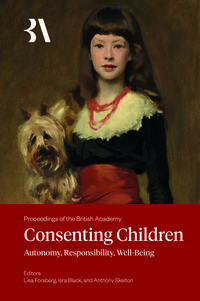Consenting Children
Autonomy, Responsibility, Well-Being
Edited by Lisa Forsberg, Isra Black and Anthony Skelton

This new edited volume, entitled Consenting Children: Autonomy, Responsibility, Well-Being (Liverpool University Press, 2025), is edited by UOIs Lisa Forsberg, Senior Research Fellow at the Uehiro Oxford Institute & Research Fellow at Somerville College, Oxford, Isra Black, Associate Professor at UCL Faculty of Laws and Anthony Skelton, Professor of Philosophy at the University of Western Ontario.
The volume is part of the series Proceedings of the British Academy and distributed by Liverpool University Press.
Children are treated differently compared to adults in many domains, including in health care, education, employment, and criminal justice. The differential treatment of children—to adults, and in the case of younger children and adolescents, to each other—makes it both practically and theoretically important to examine the justification of when and why this treatment is permissible. Because the justifications of children’s differential treatment typically appeal to foundational normative considerations—matters of autonomy, responsibility, and well-being—they provoke considerable controversy and disagreement in law and ethics, especially, though not exclusively in the contexts of health care, sexual relations, and criminal justice. Consenting Children brings together philosophers and academic lawyers to grapple with these matters and domains and to share disciplinary and interdisciplinary insights and understanding. The volume’s contributors engage in deep and fruitful discussions of children’s consent and responsibility, decision-making capacity and best interests, as well as the role, powers, and duties of parents and state institutions. The volume lays the groundwork for future engagement in the legal and philosophical literature with the controversies raised by children’s autonomy, responsibility, and well-being, and the myriad interactions between them concerning children’s consent.
Table of Contents
Introduction Consenting Children LISA FORSBERG, ISRA BLACK and ANTHONY SKELTON
Children’s Consent and Capacity
1. Setting the Standard(s) for Capacity: Are Children Different? MARY DONNELLY and BARRY LYONS
2. Competence for Minors in Medical Decision-Making: A Life-Stage Approach ANDREW FRANKLIN-HALL
3. Asymmetry of Adolescent Decision-Making Capacity and Rational Choice ISRA BLACK
4. Minors and Sexual Consent JENNIFER EPP
Children’s Consent and Other Parties
5. Children and Consent: Best Interests, Parents, and A Child’s Views DAVID ARCHARD
6. The Interaction of Children’s Capacity Regimes and Parental and Judicial Powers: A ‘Strictly’ Legal View SIR JONATHAN MONTGOMERY
7. A Future Orientated View of Autonomy EMMA CAVE
8. Medical Treatment Refusals by Teenagers and the Law: Justice that is More Caring? JO BRIDGEMAN
9. Consent to Medical Treatment for Trans Youth in Australia Steph Jowett
10. On Sharing the Normative Power of Consent PETER SCHABER
11. Treating Adolescents Differently ANTHONY SKELTON, ISRA BLACK, and LISA FORSBERG
12. Children and Ineffective Consent LISA FORSBERG
Children’s Responsibility
13. The Prospective Stance: Children and Responsibility MEGHAN WINSBY
14. Consent and Responsibility: How (Not) to Justify Diverging Thresholds for Minors MAXIMILIAN KIENER
15. What’s Special About Juvenile Justice? DAVID O. BRINK
Publisher
Published 21 October 2025, by British Academy/Proceedings of the British Academy
ISBN:9781836245674 (Hardcover) |eISBN:9781836249504 (PDF) |eISBN:9781836249573 (ePub)
Link
Distributed by Liverpool University Press.
ISBN
ISBN:9781836245674 (Hardcover) |eISBN:9781836249504 (PDF) |eISBN:9781836249573 (ePub)
Link
See Publisher site.
Review
It is [...] undoubtedly time for a volume in which the academy takes stock of most (but, thanks to the timelines of producing such a volume, not all) of these decisions. And there are few better equipped than the editorial team behind Consenting Children to bring together a group of scholars of different disciplines – and helpfully – from different jurisdictions – to reflect on the controversies raised by arguments about children’s autonomy, responsibility and well-being. The contributions range widely across three broad themes (children’s consent and capacity, children’s consent and other parties, and children’s responsibility). The contributions are never less than stimulating, even if some undoubtedly require a willingness to settle down with a wet towel and a notebook to keep track of the Greek letters being used to develop the thesis in question. [...] This book undoubtedly fulfils the editors’ ambitions to lay the groundwork for future engagement in the legal and philosophical literature with the issues covered. Some of that engagement will, I trust, be with those who spend their time thinking about related issues in adulthood – most obviously those grappling with the ever greater body of neuroscientific evidence which suggests that ‘cognitive’ adulthood does not start until 25. And I would urge a continued, and clear-eyed focus on the distinction between legal capacity and mental capacity / competence – as Sir Andrew McFarlane has recently reminded us, unless we know whether we are even in principle looking in law to the child for a decision, we are starting off on the wrong foot (and we must be careful about flinging around the term Gillick). However, overall, this is an excellent work, upon which both the editors and contributors are to be congratulated.
Alex Ruck Keene KC (Hon), Mental Capacity Law and Policy



